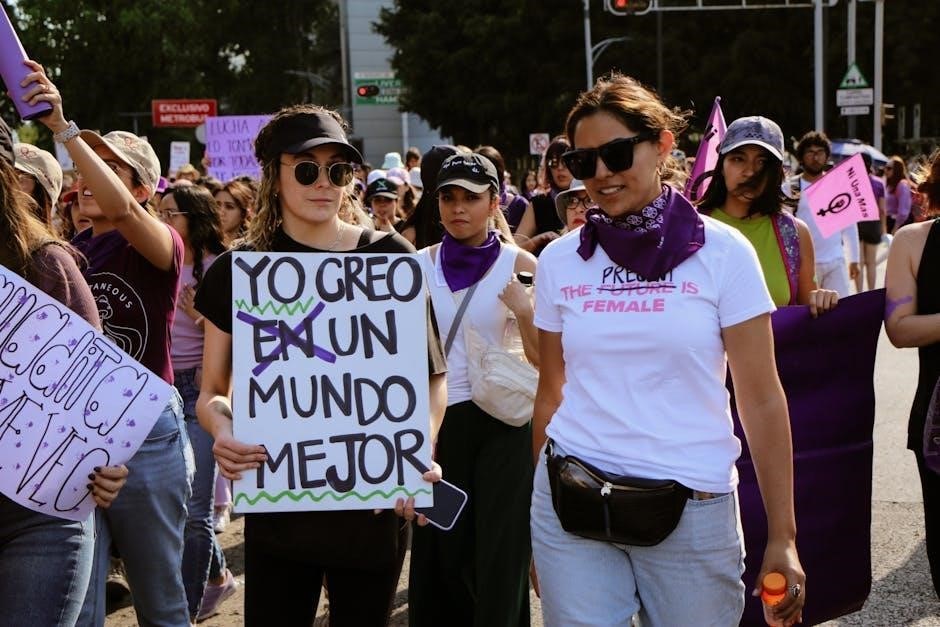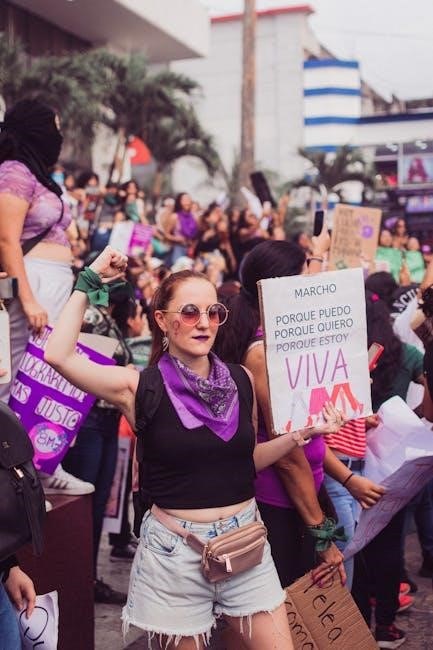
Chicana feminisms emerge from the Chicano movement, focusing on gender, race, class, and sexuality. It emphasizes situated knowledge and resistance through sitios y lenguas, decolonizing discourse and fostering empowerment.
1.1 Definition and Scope of Chicana Feminisms
Chicana feminisms is a critical framework that examines the intersections of race, gender, class, and sexuality within the experiences of Chicanas. It emphasizes the importance of situated knowledge and the decolonization of discourse. The scope includes analyzing how gendered oppression operates within Chicano communities and broader societal structures. Central to this framework are concepts like sitios y lenguas (spaces and languages), which highlight the role of cultural and linguistic resistance. This approach also critiques Eurocentric methodologies, advocating for testimonio, conocimiento, and auto-historia as tools for reclaiming and redefining Chicanas’ lived experiences.
1.2 Historical Origins and Evolution
Chicana feminisms emerged in the 1960s and 1970s as a response to the gendered limitations of the Chicano movement. Chicanas sought to address the marginalization of women within both Chicano nationalism and mainstream feminist movements. Early figures like Chela Sandoval and Gloria Anzaldúa laid the groundwork for theorizing intersectional identities. Over time, the movement integrated intersectionality, decolonial thought, and linguistic resistance, such as code-switching and the use of sitios y lenguas. This evolution emphasized the importance of lived experiences and created methodologies like testimonio and auto-historia, shifting Chicana feminisms from the margins to a central role in feminist scholarship.
1.3 Key Figures and Contributions
sitios y lenguas highlights the role of space and language in resistance. Gloria Anzaldúa’s groundbreaking work in Borderlands/La Frontera laid the foundation for theorizing identity and intersectionality. These scholars have contributed significantly to understanding gender, race, and sexuality, offering innovative frameworks like testimonio and auto-historia that center Chicana experiences and challenge colonial discourses.

Intersectionality in Chicana Feminisms
Intersectionality examines overlapping oppressions of race, gender, class, and sexuality, central to Chicana feminisms. It challenges single-axis frameworks, emphasizing lived experiences and resistance within interconnected systems of power.
2.1 Understanding Intersectionality
Intersectionality, a term coined by Kimberlé Crenshaw, refers to the interconnected nature of social identities and systems of oppression, such as race, gender, class, and sexuality. It highlights how these identities intersect to create unique experiences of discrimination and privilege. In the context of Chicana feminisms, intersectionality provides a framework to analyze how Chicana women face overlapping oppressions, challenging single-axis approaches that neglect the complexity of their lived realities. By centering marginalized voices, intersectionality offers a critical lens to understand and dismantle systemic inequities, emphasizing the importance of addressing multiple forms of oppression simultaneously.
2.2 Application of Intersectionality in Chicana Feminist Theory
Chicana feminist theory applies intersectionality to examine how gender, race, class, and sexuality intersect to shape the experiences of Chicana women. This framework challenges Eurocentric feminisms by centering the voices of women of color, acknowledging the interplay of multiple oppressions. Intersectionality is used to critique systems of power that marginalize Chicanas, such as patriarchy, racism, and economic inequality. By emphasizing situated knowledge, Chicana feminists highlight how these intersections create unique forms of resistance and resilience. This approach fosters a more inclusive understanding of social justice, bridging the gaps between theory and lived experiences. It underscores the importance of addressing overlapping oppressions holistically.
2.3 Intersectional Frameworks for Analyzing Oppression
Intersectional frameworks in Chicana feminisms provide tools to analyze how multiple forms of oppression—such as racism, sexism, classism, and heteronormativity—intersect and shape experiences. These frameworks emphasize the importance of context and lived realities, offering a nuanced understanding of power dynamics. Testimonio and conocimiento emerge as key methodologies, allowing Chicanas to articulate their struggles and resistances. By centering marginalized voices, these frameworks challenge dominant narratives and promote decolonial ways of knowing. They also highlight how language and space (lenguas y sitios) serve as sites of resistance and identity formation, fostering a deeper understanding of oppression and empowerment.

Sitios y Lenguas: Spaces and Languages
Sitios y lenguas are central to Chicana Feminisms, representing spaces and languages of resistance. They decolonize discourse, challenge colonial ideologies, and empower through identity and meaningful dialogue.
3.1 Conceptualizing Sitios (Spaces) in Chicana Feminism
Sitios, or spaces, in Chicana Feminism are conceptualized as physical, emotional, and cultural locations where identity, resistance, and decolonization unfold. These spaces, often rooted in the borderlands, symbolize the intersection of race, gender, and class. They challenge colonial narratives by reclaiming Indigenous and Chicana histories. Sitios are not just geographic but also metaphorical, representing sites of empowerment where marginalized voices can articulate their experiences. Aida Hurtado and Emma Pérez emphasize how these spaces foster decolonized discourses, allowing Chicanas to redefine their identities and resist oppression through collective memory and cultural resilience.
3.2 The Role of Lenguas (Languages) in Resistance and Identity
Lenguas, or languages, play a crucial role in Chicana Feminism as tools for resistance and identity formation. Spanish, particularly, serves as a language of intimacy, cultural preservation, and resistance against colonialism. Chicana feminists often engage in code-switching between English and Spanish to create autonomous spaces for dialogue and empowerment. Language is not merely a means of communication but a mechanism to challenge dominant discourses and assert cultural identity. By reclaiming and celebrating their linguistic heritage, Chicanas resist erasure and construct a sense of belonging and solidarity. This linguistic resistance intersects with broader struggles against racism, sexism, and class oppression, fostering a powerful form of identity politics.
3.3 Decolonizing Discourses Through Sitios y Lenguas
Decolonizing discourses through sitios y lenguas involves reclaiming spaces and languages to challenge colonial ideologies. Chicana feminists use Spanish and Indigenous languages to resist cultural erasure and assert identity. These linguistic practices create autonomous spaces where marginalized voices can flourish. By decolonizing language, Chicanas disrupt dominant narratives and reclaim their histories. Sitios, or borderland spaces, become sites of resistance where intersectional identities are affirmed. This process not only challenges systemic oppression but also fosters a liberatory framework for knowledge production. Through decolonizing discourses, Chicana feminists reconstruct their cultural and political agency, emphasizing the power of language and space in liberation struggles.

Methodologies in Chicana Feminist Research
Testimonio, conocimiento, and auto-historia are key methodologies, emphasizing narrative approaches, critical consciousness, and self-historizing to center Chicana voices and experiences in decolonial research practices.
4.1 Testimonio as a Methodological Tool
Testimonio is a narrative methodology in Chicana feminist research, centered on personal and collective stories to amplify marginalized voices. Rooted in decolonial perspectives, it challenges dominant discourses by foregrounding lived experiences. This approach validates individual truths, fostering empowerment and solidarity. Testimonio often overlaps with intersectional frameworks, highlighting how race, gender, and class intersect in shaping identities. By prioritizing oral and written narratives, it democratizes knowledge production, allowing Chicana women to reclaim their histories and resist erasure. This methodological tool is deeply political, serving as both a form of resistance and a means of healing within Chicana feminist praxis.
4.2 Conocimiento and Auto-Historia in Feminist Praxis
Conocimiento and auto-historia are central to Chicana feminist praxis, emphasizing the integration of personal experience and collective memory into knowledge production. Conocimiento, or “knowing,” refers to a holistic understanding rooted in lived realities, while auto-historia prioritizes self-writing and narrative agency. These methodologies challenge Eurocentric epistemologies by centering marginalized voices. They enable Chicana women to articulate their identities, resist erasure, and reclaim their histories. By blending the personal and political, these approaches foster empowerment and decolonial knowledge, making them vital tools for intersectional feminist scholarship and activism within Chicana communities.

4.3 Ethnographic Approaches in Chicana Feminist Studies
Ethnographic approaches in Chicana feminist studies emphasize participatory and immersive research methodologies that align with feminist principles. These methods prioritize the voices and experiences of Chicana women, often incorporating oral histories, testimonios, and collaborative fieldwork. By centering marginalized perspectives, ethnography becomes a tool for decolonizing knowledge production. Chicana feminist ethnographers engage in reflexive practices, acknowledging their own positionalities and power dynamics. This approach fosters ethical research that empowers communities while challenging dominant narratives. It bridges academia and activism, creating spaces for intersectional understanding and social justice within Chicana feminist frameworks.

The Gendered Project of Chicano Nationalism
Chicano nationalism often perpetuated machismo and excluded women, leading Chicana feminists to critique its gendered ideologies and advocate for inclusive, equitable representations of identity and struggle.

5.1 Gender Issues in Chicano Nationalist Ideologies
Chicano nationalist ideologies often marginalized gender issues, prioritizing race and class over gender equality. This exclusion led to the erasure of women’s experiences, reinforcing machismo and patriarchal norms. Chicana feminists critiqued these ideologies for silencing female voices and neglecting the intersections of gendered oppression. The movement’s emphasis on cultural pride sometimes perpetuated traditional gender roles, limiting women’s agency. This critique highlights the need for a more inclusive framework that addresses the interconnected nature of race, class, and gender oppressions within Chicano nationalism.
5.2 Representations of Women in Chicano Nationalist Discourse
Women were often marginalized or symbolically represented in Chicano nationalist discourse, frequently portrayed as cultural icons or relegated to traditional roles. Their voices and experiences were largely absent from historical narratives and political discussions. This exclusion reinforced gendered stereotypes, limiting women’s agency and contributions to the movement. The discourse rarely acknowledged the diverse lived realities of Chicanas, further silencing their perspectives. Such representations underscored the need for Chicana feminists to challenge these narrow portrayals and advocate for inclusive frameworks that address the intersections of race, gender, and class within nationalist ideologies.
5.3 Critiquing Machismo and Sexism in Chicano Movements
Chicana feminists critically examined the pervasive machismo and sexism within Chicano movements, challenging the exclusion of women’s voices and the idealization of traditional gender roles. These critiques highlighted how machismo reinforced patriarchal structures, marginalizing women and limiting their agency. Chicana feminists argued that such ideologies perpetuated inequality and erased the diverse experiences of Chicanas. By centering intersectionality, they exposed the interplay of race, gender, and class in perpetuating oppression. Their work laid the groundwork for redefining Chicano nationalism to include gender justice and challenging heteropatriarchal norms within the movement.

Educational Experiences and Chicana Feminist Epistemology
Chicana feminist epistemology addresses the racialized and gendered educational experiences of Latinx students, emphasizing the role of home languages and cultural spaces in fostering resistance and identity.
6.1 Applying Chicana Feminist Epistemology in Education
Chicana feminist epistemology provides a framework to center marginalized voices, emphasizing the importance of cultural intuition and lived experiences in educational settings. By challenging Eurocentric paradigms, it validates students’ home languages and cultural knowledge as vital to learning. This approach fosters critical consciousness and resilience, particularly for Latinx students navigating racialized and gendered educational environments. Educators can apply this epistemology by integrating testimonios, oral histories, and community-based practices, ensuring inclusive and equitable education. Such methodologies not only decolonize curricula but also empower students to reclaim their identities and resist systemic oppression through the affirmation of sitios y lenguas.
6.2 Racialized and Gendered Educational Experiences of Latinx Students
Latinx students often face intersecting racial and gender inequalities in education, shaping their experiences of marginalization and exclusion. These inequalities manifest in systemic discrimination, cultural erasure, and limited access to resources. Gendered violence and microaggressions further compound these challenges, particularly for women and non-binary individuals. Chicana feminist frameworks highlight how these intersections disproportionately affect Latinx students, perpetuating cycles of oppression. Such experiences underscore the need for educators to address these inequities by implementing inclusive practices and amplifying student voices. Recognizing these racialized and gendered dynamics is crucial for fostering equitable learning environments and empowering Latinx youth to thrive despite systemic barriers.
6.3 The Role of Home Languages and Cultural Spaces in Learning
Home languages and cultural spaces play a vital role in learning by fostering identity, resilience, and cultural continuity. Chicana feminist frameworks emphasize these spaces as sites of resistance and empowerment, where students can reclaim and celebrate their heritage. Language, particularly in its intersection with culture, serves as a tool for decolonizing education and challenging Eurocentric narratives. By valuing home languages, educators can create inclusive environments that honor students’ lived experiences, bridging the gap between academic and community knowledge. This approach not only enhances learning but also nurtures a sense of belonging and cultural pride among Latinx students.

Activism and Resistance in Chicana Feminisms
Chicana feminist activism fosters resistance through dialogue, empowering Latinas to challenge intersecting oppressions and create transformative spaces for social change and gender justice.
7.1 Creating Latina Spaces for Dialogue and Empowerment
Creating Latina spaces for dialogue and empowerment is central to Chicana feminist activism. These spaces serve as safe environments where Latinas can openly discuss intersectional issues, fostering solidarity and collective action. By prioritizing marginalized voices, such spaces challenge systemic oppression and promote gender justice. The concept of sitios y lenguas emphasizes the importance of physical and metaphorical spaces where Latinas can reclaim their identities and languages, resist colonial narratives, and build resistance. These spaces are not only sites of dialogue but also hubs for empowerment, enabling Latinas to articulate their struggles and envision transformative futures.
7.2 Code-Switching as a Form of Resistance
Code-switching, a practice of alternating between languages or language varieties, serves as a powerful form of resistance in Chicana feminist activism. By switching to Spanish or blending languages, Chicanas challenge dominant linguistic and cultural norms, asserting their identity and rejecting colonial erasure. This linguistic resistance creates sitios y lenguas, spaces where Latinas can express themselves authentically, reclaiming their voices and cultures. Code-switching also fosters solidarity, allowing Chicanas to navigate multiple identities while subverting oppressive structures. It becomes a tool for empowerment, enabling Latinas to articulate their resistance and construct alternative discourses rooted in their lived experiences.
7.3 Intersectional Activism in Contemporary Chicana Feminisms
Contemporary Chicana feminist activism embraces intersectionality to address overlapping systems of oppression, including race, gender, class, and sexuality. By centering marginalized voices, activists create sitios y lenguas that amplify resistance and foster collective empowerment. This approach critiques Eurocentric frameworks, advocating for decolonial practices that honor Latinx cultural knowledge. Intersectional activism also bridges divides with other social justice movements, promoting solidarity and inclusivity. Through grassroots organizing, art, and education, Chicana feminists challenge systemic inequalities, envisioning a future where intersectional justice prevails. Their work underscores the transformative power of intersectionality in creating equitable spaces for all.

Intersectional Chicana Feminisms and Beyond
Chicana feminisms expands beyond traditional boundaries, envisioning future directions that bridge intersectionality with global movements, fostering solidarity and inclusivity while emphasizing the universal relevance of its frameworks.
8.1 Future Directions in Chicana Feminist Theory
Future directions in Chicana feminist theory emphasize global solidarity, integrating intersectionality with decolonial thought. Scholars advocate for expanding methodologies like testimonio and sitios y lenguas to address environmental justice and health equity. Digital activism and youth engagement are prioritized to amplify marginalized voices. There is a growing focus on interdisciplinary collaboration, blending feminist theory with education, art, and policy. These efforts aim to create inclusive frameworks that honor diverse identities while challenging systemic oppression. By fostering dialogue across borders, Chicana feminisms continue to evolve, offering transformative perspectives for global feminist movements.
8.2 Bridging Intersectionality with Other Feminist Movements
Bridging intersectionality with other feminist movements fosters cross-cultural dialogue and coalition-building. Chicana feminist theories align with Black, Indigenous, and queer feminisms, emphasizing shared struggles against oppression. By integrating decolonial thought with global feminist perspectives, Chicana feminisms expand their reach. Collaborations with transnational movements address issues like migration, labor, and environmental justice. This bridging also highlights the importance of diverse methodologies, such as testimonio and sitios y lenguas, in creating inclusive frameworks. Such alliances strengthen feminist praxis, promoting solidarity and equitable solutions across borders and identities.
8.3 The Global Relevance of Chicana Feminist Thought
Chicana feminist thought resonates globally, offering frameworks for addressing intersectional oppression. Its emphasis on sitios y lenguas provides tools for decolonizing knowledge and reclaiming cultural spaces. By centering marginalized voices, Chicana feminisms inspire resistance movements worldwide. The theory’s focus on gendered violence, economic inequality, and racial justice aligns with global feminist agendas. Its methodologies, such as testimonio, are adapted across contexts, fostering transnational solidarity. This relevance underscores the universal applicability of Chicana feminist praxis in combating systemic oppression and promoting equitable futures beyond local borders.
Chicana feminisms offer a living theory of resistance, empowerment, and decolonization, emphasizing intersectionality, sitios y lenguas, and the transformative power of marginalized voices in reshaping social justice.
9.1 Summarizing Key Concepts and Contributions
Chicana feminisms offer a transformative framework for understanding intersectionality, decolonization, and resistance. Central concepts include sitios y lenguas, emphasizing the importance of space, language, and cultural identity in empowerment. The field highlights methodologies like testimonio and conocimiento, which center marginalized voices. Key contributions include critiques of machismo, challenges to Chicano nationalism, and the development of feminist epistemologies in education. By bridging intersectionality with global feminist movements, Chicana feminisms provide a living theory that continues to inspire social justice efforts and empower Latinx communities through education, activism, and cultural resilience.
9.2 The Living Theory of Chicana Feminisms
Chicana feminisms represent a dynamic, evolving body of thought that adapts to contemporary social justice challenges. As a living theory, it emphasizes intersectionality, decolonization, and empowerment through sitios y lenguas. This framework not only critiques systems of oppression but also fosters resilience and resistance. By centering the voices of Latinx communities, Chicana feminisms continue to inspire activism, education, and cultural transformation. Its adaptability ensures relevance in addressing modern issues, making it a vital lens for understanding and dismantling intersecting forms of oppression while promoting global solidarity and justice.


